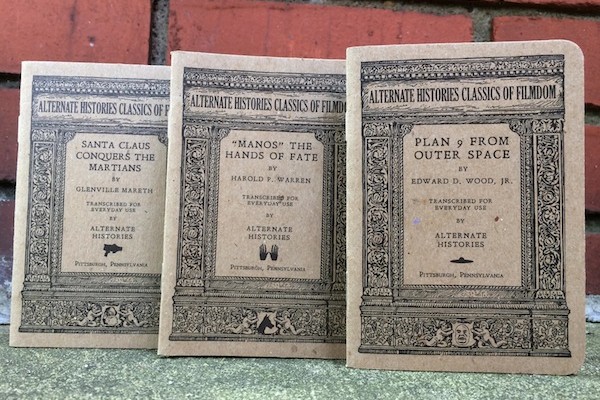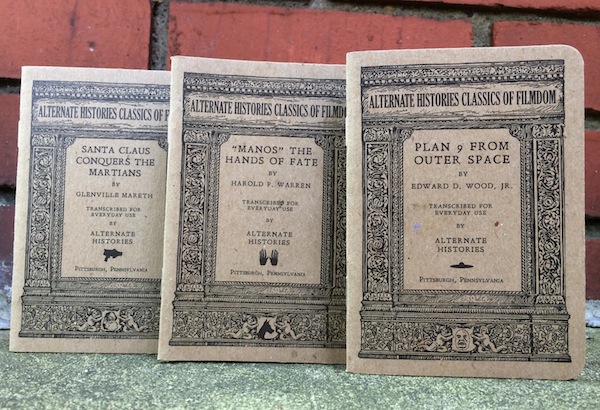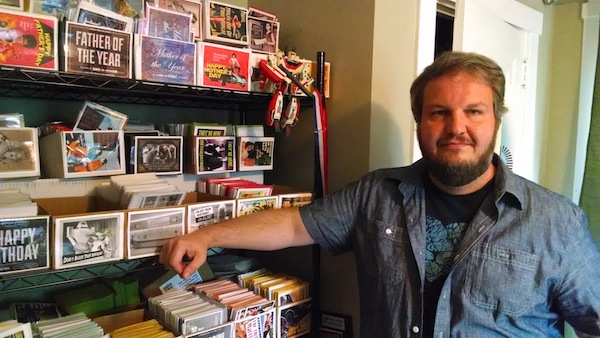37-year-old artist and writer Matthew Buchholz has no problem repping the tool he relies on to craft his pop culture-inspired pieces.
"I always joke that Photoshop is my lady," he says of the software he started using back in the early 1990s. "Photoshop and I understand each other."
The love affair has proven beneficial for the former Brooklynite who, in 2008, made Pittsburgh his home. In 2011, while working at the Lawrenceville gift shop Wildcard, he used his "lady" to add old movie monsters, robots and flying saucers into the backgrounds of vintage public domain images. Dubbed Alternate Histories, the series soon found a fan base at area craft shows and online, where it was featured on sites such as Apartment Therapy and the Huffington Post.
The success of Alternate Histories, which has expanded into a line of prints, greeting cards and a book, allowed Buchholz to become a full-time artist in 2012.
Recently, he advanced his love for kooky retro fare with Classics of Filmdom, a collection of pocket-sized designer scripts from beloved bad movies Plan 9 From Outer Space, Manos: The Hands of Fate and Santa Claus Conquers the Martians.
Sparked by a 19th century literature folio he found at East End Book Exchange, the project was a hit on Kickstarter, where it surpassed its $5,000 goal. After weeks of fundraising, transcribing and printing, the scripts were finally introduced earlier this month during a release party at Wildcard.
After unveiling his latest venture, Buchholz discusses his plans for Classics of Filmdom, his pop culture passions and life as a working artist in Pittsburgh.
Were you doing visual art before Alternate Histories?
Not really. When I moved to Pittsburgh, I knew I wanted to do something. I had done some artwork and some filmmaking in New York but never put it all together. I was trying different things and looking at a lot of images for work at Wildcard, things we could make cards out of, or images having to do with Pittsburgh. I’ve worked with a lot of artwork tangentially but [Alternate Histories] is my first true visual artwork.
In New York City, I worked at BAM [Brooklyn Academy of Music] and managed their Cinématek program for about seven years. I handled the special events, so I dealt with the filmmakers, did the artist Q&A's, and a lot of the marketing and writing. The good thing is that dealing with all of that press and marketing helped with my business because I know the importance of writing a press release. I think artists have this idea that it’s somehow gauche. But it’s 2014. That’s part of what it is at this point. You just have to get out and promote your stuff.
Your work has been exhibited in gallery shows, including one at Agnes B. in Paris, but you don't focus on fine art. Would you consider yourself a commercial artist?
I think so. I wouldn’t say I’m a fine artist, partly just because the work I do is all digital and it can all be reproduced. That is a business model for me, and it's what lets me do this full time. But it also means you have to deal with the self-promotion, sending out catalogs, printing, packaging and mailing cards. So your time isn’t spent as much with the art as you’d like. A lot of it is spent dealing with invoices.
What do you think are some of the advantages of being an artist in Pittsburgh?
It’s easy, because there’s still this openness. You can just do things. I’m maybe fortunate because my work has this pop appeal, but I think people in Pittsburgh, whether it’s an art critic, reporter or just a person on the street, are receptive to someone doing something interesting.
The other thing I think is great is that local artists and craftspeople are really supportive. When I started expanding into greeting cards I talked to Lisa [Krowinski] from Sapling Press and she was willing to answer all of my questions. And in a sense, she is a competitor. We both make cards.
I think people here feel that it's for a greater good. Maybe it’s because Pittsburgh has been down for a long time, and they want it to get better. There is a real sense of people pulling together. I’ve talked with artists in other cities like Columbus, Ohio, and they don’t feel like they have the same community.
Where do you see Classics of Filmdom fitting in with Alternate Histories?
I think it stems from the same thing, which is this love of a particular era of bad '50s and '60s sci-fi. It’s the cardboard robot, the pie plate spraypainted silver to look like a UFO. Whether it’s Harryhausen stop-motion or Ed Wood, it does feel handmade. And that I love. I like sci-fi, but I’m not a deep sci-fi person. I like this very specific niche and found a way to force it into everything I love.
Do you think Classics of Filmdom will become as popular as your previous work?
Printing those books was too expensive for me to take that big of a risk. So the Kickstarter was a good way to see if people would be interested or not. Are people going to sit down and read them cover to cover? I don’t know. That’s also why I want to do a live reading of Plan 9 and, during the holidays, a live reading of Santa Claus Conquers the Martians to try and get more people interested.
Do you want to keep expanding into new films?
If this first edition goes well, I'd like to branch into other movies that aren't necessarily sci-fi, like Ed Wood's Glen or Glenda, or the anti-pot classic Reefer Madness.
Any future projects planned?
September is the Renegade Chicago Craft Fair and the Crafty Bastards Arts & Crafts Fair in Washington, D.C., which are good places to launch new things. I have my new line of Christmas cards done, and I’m working on a fine art series of the Mona Lisa as a robot. I think that could work well as smaller pieces, or even as postcards. That and Classics of Filmdom will be the next big things for the holidays, hopefully.



